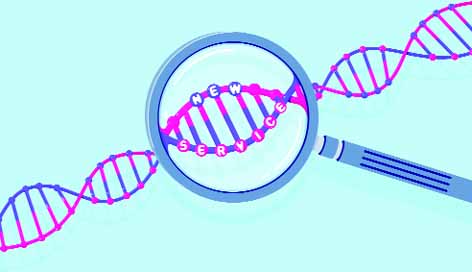Dr Richa Sharma, Dr Amit Basnotra
A family is considered complete once the baby is born especially in conservative societies- we try to pretend to be modern but still many things and thinking persists for generations.
A baby born is the bundle of Joy not only for the couple but for the whole family.Not all fortunate enough to conceive naturally and easily, some have to struggle hard and some have to seek help of Fertility specialists and with so many options available definitely patients get confused.What can help you is to be first aware and through proper authenticated sources.
To have baby is definitely the end result which couple and treating Fertility specialist both aim for but most important is to have a healthy baby.Success rates quaoted may not be the live births and the healthy baby born especially when you undertaken many IVF cycles.Here comes the role of Genetics to see that it shouldn’t be the reason of repeated failure or abnormalities.
Via this write up we will discuss basics which you should know as patient and also what your doctor need to discuss with you so that you can make an Informed Decision!!
What is Genetic Counselling?
Genetic counselling is a process of communication between patients and trained professionals intended to provide patients who have a genetic disease – or risk of such a disease – with information about their condition and its effect on their family. This allows patients and their families to make informed reproductive and other medical decisions.
The counselor will evaluate medical problems or risks present in a family, analyze and explain inheritance patterns of any disorders found, provide information about management and treatment of these disorders, and discuss available options with the family or individual.
Which All Couples Need Genetic Counseling ?
Genetic diagnostic testing of infertile males should be strongly recommended in following situations-
There is a significant risk of transmitting identifiable chromosomal abnormalities or genetic mutations to the conceptus that will severely impact its future health and well-being like in advanced maternal age
Infertile male partner who is carrier of a chromosomal abnormality, then the couple should be counseled by a certified genetics counselor and/or a clinical/prenatal geneticist on the reproductive risks of his specific abnormality e.g.- Infertile 46,XY men considering ICSI should receive genetic counseling on their risks of having a microdeletion in AZF that may be the etiology of their infertility. These men should also know that the microdeletion could be transmitted to their sons, probably resulting in their future infertility
Couples undergoing repeated IVF, having repeated implantation failures should be counseled for the risk of chromosomal abnormalities in the gametes causing implantation failures
Women conceiving after IVF-ICSI, for either male infertility or repeated implantation failures, should be counseled on their increased risk to produce offspring with sex chromosome aneuploidy, and it is reasonable to offer prenatal diagnosis as an option during their pregnancies.
All gamete donors should not carry a chromosomal rearrangement that may result in unbalanced gametes; or a familial disease with a genetic component, however, obtaining a donor karyotype is not mandatory. It is recommended that all couples undergoing gamete donation should be offered for genetic testing if they are known to carry an associated risk of transmitting it to the offspring. Counseling is encouraged for all parties including partners of donors and surrogates
Counselor should also make the couples aware that such screenings cannot provide a guarante .
Furthermore, the counselor should also discuss with the couple regarding the disposal of the embryos. The couple’s permission consent regarding disposition of the embryos should be sought.
Other options of conceiving i.e. use of donor gametes, their implications should also be discussed in detail. This reduces the risks of many a disease known to be transmitted to the offsprings by their parents.
Conclusions
Preimplantation Genetic Diagnosis /PGTA offers couples, of advanced age or those known to carry chromosomal abnormality and those conceiving wth IVF-ICSI, means of detecting these abnormal embryos, chosing the best embryo that have a good potential to implant. Therefore, all such couples should be counseled for genetic testing. Indications for testing, various tests, implications of genetic testing should be discussed with the couples, enabling them to enjoy happiness of a parenting a normal and healthy child.
(The authors are Senior IVF Consultant and Senior Gastroentrologist)
Trending Now
E-Paper


